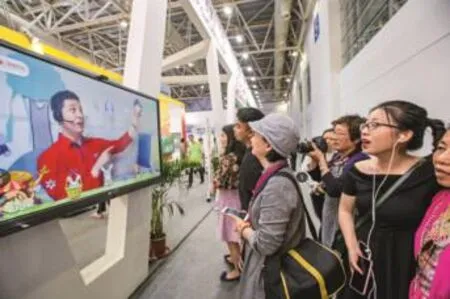COST-EFFECTIVE ENGLISH LEARNING
2019-04-26ByYaoLijuan
By Yao Lijuan
Burgeoning popularity of online Filipino English teachers in China
“At least 100,000 Filipino English teachers are needed in China, and we are going to have a platform for this,” Philippine President Rodrigo Duterte declared in April 2018. Thanks to online teaching technology, Duterte's goal might actually be met.
Not long ago, a well-known Chinese online education institution announced ambitions to recruit 100,000 English teachers from the Philippines over the next five years. Amid the rise of online education, several Chinese enterprises have targeted the Philippines as a huge “pool of highly cost-effective foreign English teachers,” inspiring tens of thousands of Filipinos to become online English tutors for Chinese families as they join the gold rush of the online education in China.
Home Office
Early one weekday morning,Mike Al fi, a young Filipino,puts on a headset, sets up brightly colored toys and starts speaking English with dancing hands in front of a computer. On the other side of the computer is a nine-yearold boy in China. Al fistarts his workday at home as an English teacher for a Chinese online education company.
In recent years, China's online education market has expanded rapidly, and demand for English teachers has risen sharply. Many Chinese enterprises are eyeing the Philippines, a neighboring oceanic country with a penetration rate of English close to that of the US and UK. Many Chinese companies such as 51Talk, First Future and Talk915 have established branches or teaching bases in the Philippines.
China's online English education platforms primarily target students ranging from kindergarten to middle school.Connected by the internet,Chinese students thousands of kilometers away from their tutors have changed the way many Filipino teachers work and go about their daily life.Because the Philippines and China are in the same time zone, the “free time” and “busy hours” of online Filipino English tutors coincide with Chinese students' school time and free time.

In 2003, a private boarding school in Guangzhou in southern China recruited a group of Filipino teachers to train students to develop good habits and learn English.
“Usually I get up at 5 a.m.,start to work at 6 and get a break after students go to school at 8 a.m.,” illustrates Al fi. “The busiest time is 6 p.m.to 10 p.m. when students come back home. On weekends, I'm busy all day. It is fun to teach Chinese children English. I work six to seven hours a day and even don't want to stop after that!”
“Weekends are prime time!” exclaims Marjie Ann, a Filipino English teacher from Bacolod. “My company set the recommended working hours according to the peak hours of students going online, but we can essentially decide when to work and how many hours to work.”
Edgardo D. Velasco, a journalist with Manila Times,said that online English teachers are categorized in the SOHO (small office, home office) group, which tends to enjoy high salaries in the Philippines. “The average monthly salary of residents in Manila is US$350, and teachers working for online English platforms can earn much more than this, so more and more Filipinos want to join this field.” Velasco says.
In fact, there is a big gap in the income of online Filipino English teachers based on personal qualifications,teaching credentials and working hours. Some industry insiders estimate that the average monthly income of Filipino teachers working at home exceeds 3,000 yuan(US$446), while some tutors earn as much as 10,000 yuan(US$1,486.7) a month.
In the Philippines, the starting salary for public school teachers is 21,000 pesos (US$397.98) per month and is much lower in private schools. According to Philippine Daily Inquirer, the monthly income of teachers in some private schools is just 6,000 pesos (US$113.71). In contrast,becoming an online English teacher with a Chinese platform is an attractive job.
Al fiis satisfied with his pay.“I cannot tell you the specific amount, but the principle is simple, more work, more money,” he reports. “I earn more than enough to support my family. This job also allows me to take care of my family because I can choose my own hours and have time to participate in important family activities.”
“English is a compulsory course in schools, and its penetration rate is near the United States. Filipinos are very good at communication and can be pretty good English teachers!”
Pros and Cons
“Filipinos are ideal English teachers!” opine local Filipinos consistently.
“We learn English at an early age,” explains a driver in Manila named Carl. “English is a compulsory course in schools,and its penetration rate is near the United States. Filipinos are very good at communication and can be pretty good English teachers!”
Eduardo Dural, a TV announcer on Inquirer 990 Television, elaborates on the advantages of Filipino English teachers in detail: “They are patient and enthusiastic. In this regard, Filipino English teachers are much better than English teachers in Western countries! Do you have space for me to be an English teacher for Chinese?”
Filipino confidence is justified. English is an official language in the Philippines and the high penetration of English is quite impressive to other Asian nations. Almost all signs in public places such as airports, supermarkets and highways are written in English. Hosts on the TV shopping channel pitch products in fluent English. All young parents speak English to children. European and American songs are commonly heard in restaurants and bars in the Philippines.
Numerous call center office buildings in Manila testify to the English proficiency in the Philippines. Outnumbering India in 2013, the Philippines has maintained a leading position in English call centers globally for years. Call centers have transformed Manila into a city that never sleeps. Since most customers they serve are based in Europe and the US, a full day's work of a call center usually begins just as night falls. On the other side of the phone, customers may not even realize that the customer service agents speaking fluent English are in the Philippines. Statistics show that approximately 1.2 million Filipinos across the country work in call centers, and some have already shifted to online English teaching.
Although almost every Filipino can speak fluent English, accurate English pronunciation is more difficult to ensure. Because the Philippines was an American colony for about five decades,Filipino English pronunciation comes with a clear American accent, and many Filipinos'pronunciation is flavored by a local accent. Filipinos who receive higher education tend to have more accurate pronunciation.

A Chinese kid is taking an English lesson via an online education platform.

Citizens experience online English lessons at the first Digital China Summit in Fuzhou, capital of Fujian Province, on April 23, 2018.
Accent is the biggest concern for Chinese parents when considering a Filipino English teacher. When one searches for “Filipino English teacher”on a China's search engine,“Filipino English teacher's accent” appears at the top of the “related search” section.
“English is not mother tongue for the Filipinos,” notes a Beijing mother surnamed Xiong. “Many Chinese parents'English is not good, so they cannot tell whether an English teacher's pronunciation is accurate or not. So choosing an English teacher from Europe or the US is more reliable!”
Chinese online education companies offering Filipino English teachers emphasize that they strictly check their English teachers' accent before hiring.
Huang Jiajia, founder and CEO of 51Talk, listed the requirements for recruiting Filipino English teachers: “They need to be college graduates and pass a pronunciation exam and a test on singing children's songs. They also need to have computers and internet access suitable for online teaching.Those who meet the above requirements may still need to receive training and then undergo a simulated teaching test. Only those who pass the final exam get the job. We receive tens of thousands of applications each month, and only 3 percent of Filipino job seekers manage to pass all the tests!”
The selling point of Filipino English teachers is the price,which is attractive to English learners in China. The rate for a 25-minute online course taught by a teacher either from Europe or the US is more than 120 yuan (US$19.1), but the price is just 40 yuan (US$6.4)for a Filipino English teacher.Some companies have even introduced a course with a price tag of just 10 yuan(US$1.6).
It will take time for Filipino English teachers to gain more popularity and recognition from Chinese customers. “I focus on practical results,” says a woman named Chen from Wuhan. “If I feel the teacher is good in the trial session,I would consider a Filipino English teacher for my child.”
Common Opportunity
Before becoming an online English teacher, Al fihad worked in a call center for an American company for many years, and Marjie Ann was a supervisor at a call center and had appeared in several English stage plays.
“We need to pass an exam on English pronunciation and take language training for one to two months before working in a call center,” Alif reveals. “The online English platforms also assess the language proficiency of job seekers.”
How many Filipino English teachers like Al fiand Ann are getting paid by China's online education platforms? The exact number is unknown.But 51Talk alone employs 16,000 Filipino English tutors,and First Future and other companies have more than 1,000 each. Not long ago, one Chinese enterprise announced it would hire 100,000 Filipino English teachers over the next five years.
Alongside Chinese companies, online English platforms from South Korea and Japan also recruit English teachers in the Philippines,but their recruitment scale is far from that of Chinese companies.
An important challenge for China's online education companies to expand rapidly in the Philippines is internet infrastructure. Eduardo Dural believes that online English teaching is currently gaining momentum in the Philippines,but online teaching has higher demands in terms of equipment, and the overall network speed remains slow in the country. This has hindered English teaching from becoming wildly popular in the Philippines.
The Philippine government has already started promoting Filipino English teachers.Duterte said before attending the Boao Forum for Asia in 2018 that his government would help 100,000 Filipino English teachers secure jobs in China. Philippine Ambassador to China Chito Sta Romana recently reported that the two governments have reached an agreement under which Chinese universities will hire 2,000 qualified Filipino English teachers. “We are approaching the final step,” Ambassador Sta Romana says.
If so many Filipino teachers come to China to work in the future, will it challenge China's online education companies?The head of an online English education platform thinks it would be good news for them:“It would evidence the Chinese government's recognition of Filipino English teachers which would in turn help change the traditional mindset that only Americans or British people can teach English. We believe that as Filipino English teachers become more widely accepted, China will develop a complete teacher assessment system and standardize the whole industry.”
The option to go to China to teach English is a new opportunity for many Filipino teachers. “I have learned a lot about China since becoming an online teacher,” says Ann. “I often eat Chinese food now and have several Chinese friends.Even one entertainment company I worked with is operated by a Chinese Filipino.It would be a great opportunity to go to China to teach English.I will see and am open to any opportunity.”
Al fihas set a goal to learn Chinese. “I ask my students questions in English when I teach, but they don't understand, so I started learning Chinese organically,”he explains. “If I got an opportunity to go to China to work, I would definitely go.Why wouldn't I?”
